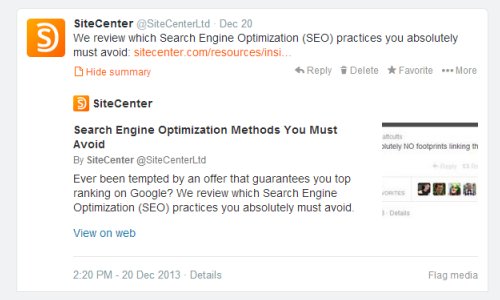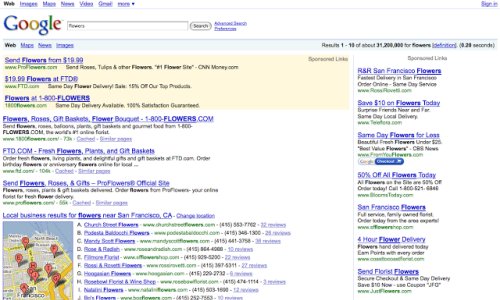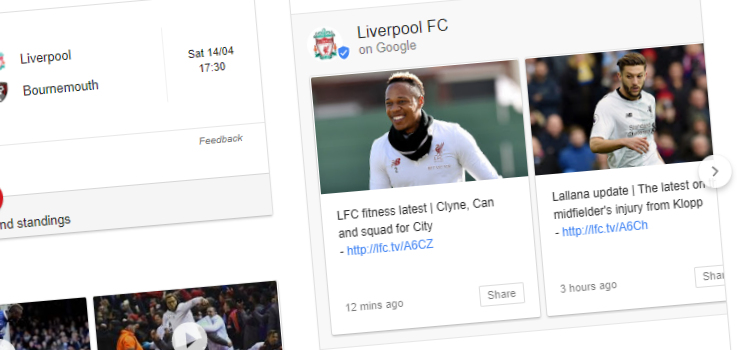A common misconception among those new to the internet is the premise that "if you build it they will come". Typically, a slight surge in visitors to a new website by the owner's friends, family and clients is followed by a flat-lining visitor graph, with the website owner wondering exactly what went wrong. In this article we provide a broad introduction to each of the main online marketing methods and who should use them.
Online marketing should focus on two different audiences: New visitors and returning visitors. While it's crucially important to gain new visitors, nothing will contribute to your website's long-term success more than making it attractive to previous visitors to return. Part of this involves reaching out to visitors who did not carry out a desired action on your website (such as making a purchase),a strategy called "re-marketing". Fortunately, the marketing methods used for each of these audiences often overlap.
Search Engine Optimization (SEO)
No matter whether your website has an established following of millions of users, or your website is brand new, you should be engaged in Search Engine Optimization (SEO) activities to some extent. SEO involves both making sure that your website is built in a manner that allows it to be found and indexed by search engines (being indexed by a search engine means being included in search results),and increasing your search engine rankings for keywords (search phrases) that are important to you.
Your search engine rankings can be increased in a number of ways but the most common approaches include producing original content that is both high quality and relevant, and trying to attain links to your website from other websites that both rank highly and are relevant to your keywords. A common mistake is to reduce SEO activities once they yield results: If you take your foot of the gas and discontinue SEO for a website, it is inevitable that one of your competitors will subsequently overtake you in search results. For this reason, SEO should be seen both as an integral part of maintaining a website, and as an ongoing enterprise.
A specific type of SEO, suited only to "bricks-and-mortar" businesses that operate in their local area, can yield high rankings with less investment than traditional SEO and in much less time. "Local SEO" applies specifically to searches that have a localized nature, for example "accountants in Chicago", and involves setting-up and optimizing a Google+ Local page for your business. If your business has a physical location and Google shows local search results for your type of business in your area, you can almost immediately start attracting new customers to your business by engaging in Local SEO, regardless of how well optimized your website is.
For a more detailed look at SEO, read our Introduction to Local Search Engine Optimization, Introduction to Search Engine Optimization and Search Engine Optimization Methods You Must Avoid.
Social Media Marketing
Social media marketing has become ubiquitous in online marketing and your website should be marketing on all the major social media platforms. According to a 2012 study by HubSpot, 77% of companies using Facebook have acquired customers as a result. But even if you don't believe in the effectiveness of social media marketing, or have the time or resources to invest in making it work, the value to your SEO efforts of the links from these websites to yours should be enough to convince you to at least have a social media presence.

You should also be offering your website visitors the ability to stay up-to-date with your website via the social media platform of their choice - for the same reason as you send marketing emails about new content or products, you should be adding updates to your social media pages. In this sense, social media offers an excellent opportunity to re-market to missed opportunities. Social media can also allow you to build more personal relationships with customers and demonstrate your dedication to customer service via the public resolution of any problems that arise.
Email Marketing
Email marketing is probably the most widely used online marketing strategy, and for good reason. Whilst it is relatively cheap compared to other forms of online marketing it consistently yields high conversion rates, partly due to the ease in which email campaigns can be highly personalized to the recipient. In addition, the fine-tuning of email marketing is easier than with other forms of marketing because campaign statistics are easy to come by if a suitable email sending platform is used.
In most scenarios email marketing will not be used to attract new visitors to your website, unless you are specifically buying or renting a database of leads. This means that in most cases email marketing is directed at people who have previously opted-in to receiving communication from you. This is a privilege that you must be careful to both make the most of, but also not abuse (sending too many email marketing messages will encourage people to unsubscribe and damage your reputation).
When people have given you their email address it is because they want to receive emails from you, perhaps about new content, special offers or new products, and you should never miss an opportunity to take advantage of this to attract them back to your website. Periodic email marketing also allows you to simply maintain a relationship with your previous visitors through re-marketing: It is more than likely that at least one visitor who did not purchase from you but who subscribed to your mailing list will become a customer in the future. These prospective customers are simply not going to remember you when the time comes that they ready to make a purchase unless you maintain contact with them.
Since it costs a website owner nothing (except perhaps web designer fees),every website owner should be collecting email addresses from visitors. And if you don't think you have anything to email subscribers about, then it's time to get creative. Many emails sent to your subscribers can be made to be sent automatically when a particular trigger occurs. An example of a creative email trigger includes sending an email to a logged-in member when they have added items to their shopping cart but failed to check out - in this case your website could send a personalized email asking if they require any assistance or would like to provide a reason why they did not check out.
Paid Online Marketing
According to the IAB (Internet Advertising Bureau), online advertising spend has increased from $2 billion per year in 2010 to $10 billion per year in 2013. Before paid search advertising was invented, most of this was spent by major brands advertising with graphic advertisements such as banner ads on major portals like Yahoo!. Advertising like this was largely untargeted and therefore represented a poor return on investment unless the motivation was simply brand awareness.
With the rise of self-service low-budget online advertising methods like Google Ads, most online advertising spend is now by small- and medium-sized businesses. This type of advertising allows advertising to target their ads not only at people making specific searches, but also at specific demographics. Not only that, but the advertiser only pays for advertising when someone clicks on their ad - no matter how many times their ad is displayed (referred to as Pay-Per-Click or PPC Marketing). The beauty of programs such as this when compared to traditional advertising such as print media, is that the statistics you are provided with prove whether your advertising is working and what each of your customers from that source have cost you in advertising spend. This allows you, in effect, to implement a strategy of "buying" customers.

Companies that pay for search advertising typically do so for one of two reasons. Firstly, many major brands pay for adverts to be returned when their brand is searched for, even if they are the highest search result for such terms, to ensure that they don't lose customers to ads of rival companies (Google Ads allows anyone to advertise their website for search queries relating to specific brands and trademarks). Secondly, many small businesses who are not among the top results for a search term that is important to them, perhaps in a particularly competitive industry, pay for search advertising so that they can gain customers via search engines that they would otherwise not have had.
When you use paid search marketing you sometimes also have the ability to retarget website visitors who you failed to sell to. Ever wondered why you could be browsing, for example, men's shirts and then later see adverts for men's shirts on an entirely unrelated website? This is an example of re-marketing, and such a system allows you to continue advertising your products or services to website visitors who originally clicked on one of your paid adverts and then left your website without being converted to a sale.
Paid search marketing, or PPC marketing, is often relatively inexpensive to set up and can be particularly cost-effective if you sell either high value products or services or you have high profit-margins. And since your exact advertising spend can be limited by your budget, no matter how low, paid online marketing is something you should consider as part of your overall marketing strategy. However, you should be conscious of the fact that to attain reliable statistics with which to judge the success of any campaign you will need to spend a reasonable amount of money.
Specialist Online Marketing
There are certain online marketing methods that are both exclusive to certain industries, and almost imperative to success in those industries. These approaches concentrate on attracting potential buyers of products or services.
- Independent websites that advertise property for sale or for rent will struggle to attract any visitors without advertising on major property portals such as Zillow (primarily US-focused) or PrimeLocation (primarily UK-focused). Real estate websites will typically list their properties on their own website and these will be automatically fed to property portals via XML feeds so that they can be found by the millions of users that search these portals.
- Successful ecommerce websites will sometimes advertise their products on comparison shopping engines such as PriceGrabber or Shopzilla in order to market their products to a wider audience. However, this is usually only beneficial if they are selling unusual items or are priced competitively when compared with larger retailers.
- Another method often employed by ecommerce websites is the use of affiliate programs, either in-house or using a third-party service (such as Commission Junction). An affiliate program allows other websites to sell your products or services and earn a commission for doing so. While this can introduce more overhead, the commission rate can be set to match the cost per sale of other marketing strategies.
Other Online Marketing Methods
Most other online marketing methods are concerned with attracting previous visitors back to your website:
- If your website is ever updated with new content, your website should have an RSS Feed for as many types of content as you offer. For example, you should have a separate RSS Feed for your news, blog and product sections. This allows website visitors who want to engage with you without submitting their email address or following you on social media to stay up-to-date with your website's offerings.
- Few re-marketing efforts work as well as offering your previous visitors a good reason to return on their own accord. Websites that have active community forums or very useful tools or resources often find that they don't have to invest much time into re-marketing because their visitors will return all by themselves. And every time they do represents another opportunity to sell your product or service to them.
- We always recommend offering your website visitors as many ways as possible to stay in touch. But you may also consider offering them an alternative to visiting your website, in the form of a Mobile App. Visiting your website may not suit their lifestyle, or their needs, and offering an alternative means with which to purchase your product or service, or access your content, can mean you are more likely to earn their business.
Conclusion
As we have seen, there are many ways to market and re-market your website in the online arena. As a website owner, if you are not actively engaged in at least Search Engine Optimization (SEO),social media marketing and email marketing then your website investment may have been largely wasted and your business will simply not benefit from your website in the way that it should. If you have embraced these methods and are still not enjoying success, you should be seriously considering additional marketing methods, such as paid marketing, or at least formulating a re-marketing strategy to retain more of your previous visitors and customers.


